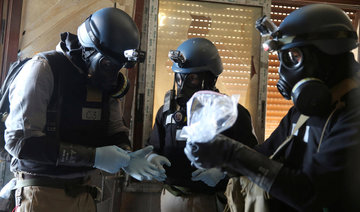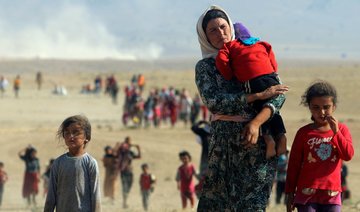JEDDAH: The Syrian opposition’s High Negotiations Committee (HNC) said on Thursday it is ready to back a Russian-brokered constitutional reform initiative for Syria, so long as it is led by the UN.
Yahya Al-Aridi, opposition spokesman, told Arab News: “Russia can’t be trusted. We had a horrible experience with Russia in Astana. Promises were given and broken. But Russia cannot run away from UN Security Council resolutions, however it tries. These resolutions need to be implemented. And there is international legality that Russia should abide by.”
Nasr Al-Hariri, who heads the committee that represents the Syrian opposition in UN talks with the regime, said any constitutional committee must be formed at the UN, and include representation from his group.
Al-Aridi said the issue of representation should be entrusted in the hands of Staffan de Mistura, UN special envoy for Syria, “who is supervised by UN resolutions, in addition to the participation of the parties concerned and mentioned in UN Resolution 2254.”
Al-Hariri spoke in Istanbul at a press conference on Thursday, two days after Russia convened its Syria Congress for National Dialogue in Sochi. The HNC boycotted the congress, saying it would not lead to peace. Russia is a key ally of the Syrian regime.
Syrian state media, a mouthpiece of President Bashar Assad, said the regime will have two-thirds of the representation on the committee.
Al-Aridi said: “The regime doesn’t want two-thirds. Even if it were to be given the whole representation, it is not ready to get into this.” But, said Al-Aridi, the power of the UN Security Council would ensure the regime complies.
Al-Hariri said the HNC would not accept having a committee appointed at Sochi.
Al-Aridi said the opposition had no doubt that “the regime would continue to play games and to try as hard as it can to detach itself from the political process.”
However, when it was in the hands of the UN and its special envoy, there were certain guarantees, he said. “The UN envoy has, as we understand, got the consent of the Russians who came out of the negotiations in Vienna and Sochi.”
Meanwhile, the UN humanitarian adviser said a humanitarian task force has been unable to make deliveries to desperate Syrians for the past two months as the Assad regime has withheld approval for UN aid convoys.
Before they can move into besieged areas or across front lines, the convoys require letters from the regime and security guarantees from armed groups.
“It’s an all-time low in giving us the facilitation letters,” adviser Jan Egeland told reporters after meeting senior diplomats in Geneva.
Insurgents fighting Assad’s forces were also creating obstacles, contributing to the worst situation since 2015, he said.
Egeland called on Russia, Turkey and Iran to de-escalate the fighting in Idlib governorate, which he said was “screaming for a cease-fire.”
In another development, Syria has complained to the UN about the Turkish offensive on a Kurdish enclave in its northwestern region, calling it a “blatant aggression” and a violation of the international organization’s charter.
In a letter to the UN published on Thursday, Syria’s Foreign Ministry said any foreign troops’ presence on its land without its approval is “an aggression and an occupation that will be treated accordingly.” It didn’t elaborate.
Turkey, together with Syrian allied fighters, launched the assault on Afrin on Jan. 20, stating it aims to drive the Kurdish militia in charge there away from its borders. Afrin is not under government control, but is led by a Kurdish militia that Turkey accuses of terrorism.
Syrian opposition to work with Sochi proposal ‘under UN auspices’
Syrian opposition to work with Sochi proposal ‘under UN auspices’

King Charles donates to International Rescue Committee’s Syria aid operation

- Donation will fund healthcare, protect children, provide emergency cash
LONDON: King Charles III has helped pay for urgent humanitarian aid needed in Syria after the fall of Bashar Assad.
Charles made an undisclosed donation to International Rescue Committee UK to fund healthcare, protect children and provide emergency cash.
The king is the patron of the charity, which says Syria is facing profound humanitarian needs despite the defeat of the Assad regime by opposition forces.
Khusbu Patel, IRC UK’s acting executive director, said: “His Majesty’s contribution underscores his deep commitment to addressing urgent global challenges, and helping people affected by humanitarian crises to survive, recover and rebuild their lives.
“We are immensely grateful to His Majesty The King for his donation supporting our work in Syria. This assistance will enable us to provide essential services, including healthcare, child protection and emergency cash, to those people most in need.”
The charity said it was scaling-up its efforts in northern Syria to evaluate the urgent needs of communities. Towns and villages have become accessible to aid groups for the first time in years now that rebel forces have taken control of much of the country.
The charity said Syria ranks fourth on its emergency watchlist for 2025 and a recent assessment found that people in the northeast of the country were facing unsafe childbirth conditions, cold-related illnesses, water contamination, and shortages of medical supplies.
Charles last month said he would be “praying for Syria” as he attended a church service in London attended by various faiths.
The king met Syrian nun Sister Annie Demerjian at the event, who described the situation in her homeland after the regime had been swept from power.
After Ocalan visit, Turkiye opposition MPs brief speaker, far-right leader

ISTANBUL: A delegation from Turkiye’s pro-Kurdish opposition DEM party met Thursday with the parliamentary speaker and far-right MHP leader amid tentative efforts to resume dialogue between Ankara and the banned PKK militant group. DEM’s three-person delegation met with Speaker Numan Kurtulmus and then with MHP leader Devlet Bahceli.
The aim was to brief them on a rare weekend meeting with Abdullah Ocalan, the jailed founder of the Kurdistan Workers’ Party who is serving life without parole on Imrali prison island near Istanbul.
It was the Ocalan’s first political visit in almost a decade and follows an easing of tension between Ankara and the PKK, which has waged a decades-long insurgency on Turkish soil and is proscribed by Washington and Brussels as a terror group.
The visit took place two months after Bahceli extended a surprise olive branch to Ocalan, inviting him to parliament to disband the PKK and saying he should be given the “right to hope” in remarks understood to moot a possible early release.
Backed by President Recep Tayyip Erdogan, the tentative opening came a month before Syrian rebels began a lightning 12-day offensive that ousted Bashar Assad in a move which has forced Turkiye’s concerns about the Kurdish issue into the headlines.
During Saturday’s meeting with DEM lawmakers Sirri Sureyya Onder and Pervin Buldan, Ocalan said he had “the competence and determination to make a positive contribution to the new paradigm started by Mr.Bahceli and Mr.Erdogan.”
Onder and Buldan then “began a round of meetings with the parliamentary parties” and were joined on Thursday by Ahmet Turk, 82, a veteran Kurdish politician with a long history of involvement in efforts to resolve the Kurdish issue.
Iraq’s Sulaimaniyah city bans groups accused of PKK links

SULAIMANIYAH: Authorities in the Iraqi Kurdish city of Sulaimaniyah have banned four organizations accused of affiliation with the Turkish-blacklisted Kurdistan Workers Party, activists said Thursday, denouncing the move as “political.”
The four organizations include two feminist groups and a media production house, according to the METRO center for press freedoms which organized a news conference in Sulaimaniyah to criticize the decision.
PKK fighters have several positions in Iraq’s northern autonomous Kurdistan region, which also hosts Turkish military bases used to strike Kurdish insurgents.
Ankara and Washington both deem the PKK, which has waged a decades-long insurgency in Turkiye, a terrorist organization.
Authorities in Sulaimaniyah, the Iraqi Kurdistan region’s second city, have been accused of leniency toward PKK activities.
But the Iraqi federal authorities in Baghdad have recently sharpened their tone against the Turkish Kurdish insurgents.
Col. Salam Abdel Khaleq, the spokesman for the Kurdish Asayesh security forces in Sulaimaniyah, told AFP that the bans came “after a decision from the Iraqi judiciary and as a result of the expiration of the licenses” of these groups.
Israeli military says commandos raided missile plant in Syria in September

JERUSALEM: Israel’s military said on Thursday its special forces raided an underground missile production site in Syria in September that it said was primed to produce hundreds of precision missiles for use against Israel by the Iranian-backed Hezbollah.
The complex near Masyaf, in Hama province close to the Mediterranean coast, was “the flagship of Iranian manufacturing efforts in our region,” Israeli military spokesperson, Lt. Col. Nadav Shoshani told a briefing with reporters.
“This facility was designed to manufacture hundreds of strategic missiles per year from start to finish, for Hezbollah to use in their aerial attacks on Israel,” he said.
He said the plant, dug into the side of a mountain, had been under observation by Israeli intelligence since construction work began in 2017 and was on the point of being able to manufacture precision-guided long-range missiles, some of them with a range of up to 300 km (190 miles).
“This ability was becoming active, so we’re talking about an immediate threat,” he said.
Details of the Sept. 8 raid have been reported in the Israeli media in recent days but Shoshani said this was the first confirmation by the military, which usually does not comment on special forces operations of this type.
At the time, Syrian state media said at least 16 people were killed in Israeli airstrikes in the west of the country.
Shoshani said the hours-long nighttime raid was “one of the more complex operations the IDF has done in recent years.” Accompanied by airstrikes, it involved dozens of aircraft and around 100 helicopter-borne troops, who located weapons and seized documents, he said.
“At the end of the raid, the troops dismantled the facility, including the machines and the manufacturing equipment themselves,” he said, adding that dismantling the plant was “key to ensure the safety of Israel.”
Israeli officials have accused the former Syrian government of President Bahar Assad of helping the Lebanese-based Hezbollah movement receive arms from Iran and say they are determined to stop the flow of weapons into Lebanon.
As Bashar Assad’s government crumbled toward the end of last year, Israel launched a series of strikes against Syrian military infrastructure and weapons manufacturing sites to ensure they did not fall into the hands of its enemies.




















